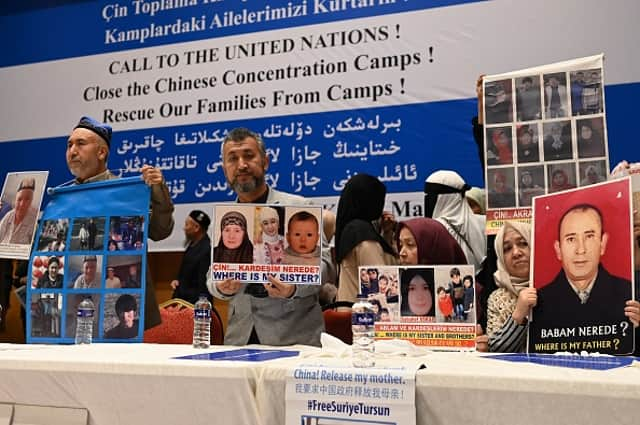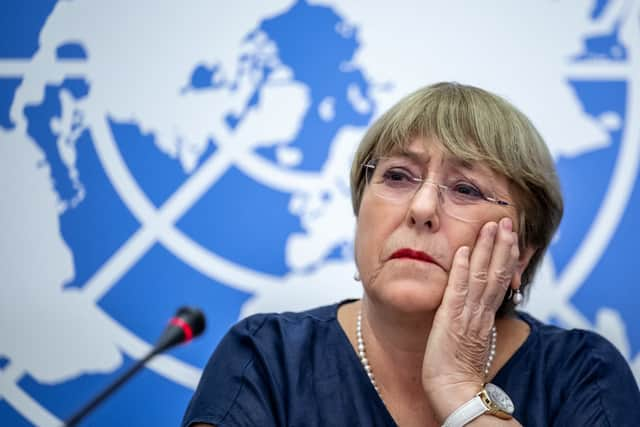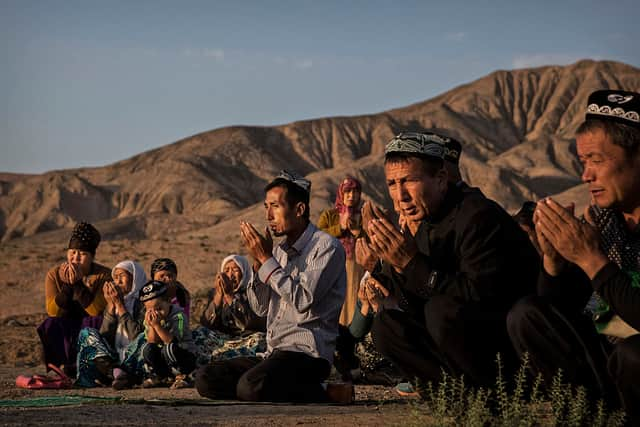Uyghurs in China: abuse claims in Xinjiang province explained, was there a genocide, what does UN report say?


The UN has accused China of “serious human rights violations” in a long-awaited report into claims of abuse in Xinjiang province.
Investigators said they found “credible evidence” of torture possibly amounting to “crimes against humanity”, which China denies.
Advertisement
Hide AdAdvertisement
Hide AdThe announcement comes exactly a year, where UN High Commissioner for Human Rights Michelle Bachelet said that her office was “finalising its assessment of the available information on allegations of serious human rights violations in that region, with a view to making it public.”


And it warns that the “arbitrary and discriminatory detention” of such groups in Xinjiang, through moves that stripped them of “fundamental rights may constitute international crimes, in particular crimes against humanity.”
Earlier this year, thousands of images from China’s highly secretive mass detention system were hacked from regional police computer servers and handed to the BBC.
After months of investigation and authentication, the “Xinjiang Police Files”provided fresh insight into the imprisonment of Uyghurs and other minorities in the region.
Advertisement
Hide AdAdvertisement
Hide AdHuman rights organisations claim China has arrested over one million Uyghurs against their will in a vast network of "re-education centres", and sentenced hundreds of thousands to prison terms in recent years.
Several countries have accused China of genocide in Xinjiang, including the United States.
But who are the Uyghurs, and why are they being persecuted?
Here is everything you need to know about it.
Who are the Uyghurs?
The Uyghurs are an ethnic group that originated in and is culturally associated with the Central and East Asian region.
They are one of China’s 55 officially recognised ethnic minorities, and are native to the Xinjiang Uyghur Autonomous Region in Northwest China.
Advertisement
Hide AdAdvertisement
Hide AdThe Uyghurs have historically lived in a number of oases strewn throughout the Taklamakan Desert in Southwestern Xinjiang. Throughout history, these oasis existed either as autonomous states, or were ruled by a variety of civilizations.


An estimated 80% of Xinjiang’s Uyghurs still live within the Tarim Basin, an area in Northwest China of about 390,000 square miles.
The rest of Xinjiang’s Uyghurs dwell primarily in Ürümqi, the province’s capital, while major Uyghur populations also exist in Kazakhstan, Kyrgyzstan, Uzbekistan, Pakistan, and Turkey; smaller communities still are found in Saudi Arabia, Jordan, Australia, Russia, and Sweden.
Why are there tensions?
During the 10th century, the Uyghurs started to become Islamized, and by the 16th century a majority of Uyghurs identified as followers of Islam, a faith that has played an essential part in Uyghur culture and identity.
Advertisement
Hide AdAdvertisement
Hide AdIslamophobia could go some way to explaining their persecution at the hands of the Chinese government, but it is just one factor in a long and complex relationship between the two.
The most recent era of repression began in 2014, when Uyghurs living in Xinjiang began to be exposed to widespread abuses at the hands of the Chinese government, including forced sterilisation and forced labour, and the implementation of substantial controls and limitations on their religious, cultural, economic, and social lives.
Increased police monitoring in Xinjiang looks for evidence of “religious extremism”, which in the eyes of the Chinese government can be something as simple and inconclusive as growing a beard or quitting smoking or drinking.
But tension between the Uyghurs and the Chinese government has existed long before now.
Advertisement
Hide AdAdvertisement
Hide AdSince the incorporation of the Xinjiang region into the People’s Republic of China in 1949, factors such as government policies promoting Chinese culture while suppressing demonstrations of Uyghur identity, as well as strong responses to separatism, have contributed to tensions.
This has taken the form of wide public unrest and disorder, spun by the Chinese government as anti-Chinese separatism.
What is China accused of?
Several countries, including the United States, the UK, Canada, and the Netherlands, have accused China of genocide, which is defined as the "intent to destroy, in whole or in part, a national, ethnical, racial or religious group".
Reports say China has been forcibly mass sterilising Uyghur women in order to decrease the population, as well as taking children from their families and attempting to destroy the group’s traditions.
Advertisement
Hide AdAdvertisement
Hide AdSince 2017, at least one million Uyghurs have been unlawfully jailed in Xinjiang internment facilities, according to experts.
Chinese government officials assert that these camps are used to ensure adherence to the Chinese Communist Party’s (CCP) doctrine, prevent separatism, combat terrorism, and provide vocational training to Uyghurs.
But physical, mental, and sexual torture have been recorded by some who have managed to flee the camps. Women have spoken out about rape in the streets and sexual assault.
All accusations of human rights violations in Xinjiang are denied by China.
It claims that militants are organising bombing, sabotage, and civil disturbanc, but it is accused of exaggerating the threat in order to justify it persecution of the Uyghurs.
Comment Guidelines
National World encourages reader discussion on our stories. User feedback, insights and back-and-forth exchanges add a rich layer of context to reporting. Please review our Community Guidelines before commenting.
